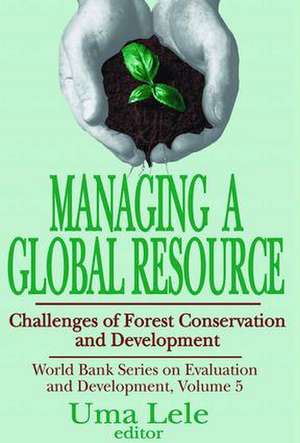Managing a Global Resource: Challenges of Forest Conservation and Development: Advances in Evaluation & Development
Editat de Uma J. Leleen Limba Engleză Paperback – 30 sep 2002
| Toate formatele și edițiile | Preț | Express |
|---|---|---|
| Paperback (1) | 419.11 lei 6-8 săpt. | |
| Taylor & Francis – 30 sep 2002 | 419.11 lei 6-8 săpt. | |
| Hardback (1) | 1002.63 lei 6-8 săpt. | |
| Taylor & Francis – 30 sep 2002 | 1002.63 lei 6-8 săpt. |
Preț: 419.11 lei
Nou
Puncte Express: 629
Preț estimativ în valută:
80.19€ • 83.96$ • 66.36£
80.19€ • 83.96$ • 66.36£
Carte tipărită la comandă
Livrare economică 05-19 aprilie
Preluare comenzi: 021 569.72.76
Specificații
ISBN-13: 9780765809407
ISBN-10: 0765809400
Pagini: 340
Dimensiuni: 152 x 229 x 25 mm
Greutate: 0.52 kg
Ediția:1
Editura: Taylor & Francis
Colecția Routledge
Seria Advances in Evaluation & Development
Locul publicării:Oxford, United Kingdom
ISBN-10: 0765809400
Pagini: 340
Dimensiuni: 152 x 229 x 25 mm
Greutate: 0.52 kg
Ediția:1
Editura: Taylor & Francis
Colecția Routledge
Seria Advances in Evaluation & Development
Locul publicării:Oxford, United Kingdom
Cuprins
1: Managing a Global Resource: An Overview; 2: Costa Rica: At the Cutting Edge; 3: China: The World’s Largest Experiment in Conservation and Development; 4: India’s Forests: Potential for Poverty Alleviation; 5: A New Deal for Cameroon’s Forests?; 6: Forest Management in Indonesia: Moving from Autocratic Regime to Decentralized Democracy; 7: Brazil’s Forests: Managing Tradeoffs among Local, National, and International Interests; 8: The Way Ahead
Descriere
The rapid loss of tropical forests, particularly in the developing world, has been a global concern since the late 1980s and has prompted a variety of international initiatives to save the forests



































